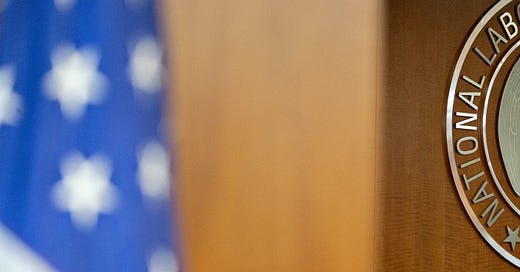The Abruzzo Nomination is Great News For Labor Law Enforcement
Biden's selection for the NLRB General Counsel role can revive some transformative projects.
In news that shouldn’t be much of a shock to anyone who followed the presidential transition period and his early administration, President Joe Biden today nominated Jennifer Abruzzo to serve as the General Counsel of the National Labor Relations Board. If confirmed, she will replace Peter Sung Ohr in the position, who is currently serving as Acting GC.
This news should be celebrated by anyone that cares about the NLRB, the National Labor Relations Act, and the former’s effective enforcement of the latter. Abruzzo is a former career NLRB attorney who rose to the number-two spot in the GC’s office when Obama nominee Richard Griffin elevated her to the role of Deputy General Counsel. After briefly serving as the Acting GC following the expiration of Griffin’s term, Abruzzo left the agency almost immediately once Trump nominee Peter Robb was confirmed by the Senate and took a top attorney position with the Communications Workers of America. She’s remained there for the last several years, likely hoping to return to the NLRB in precisely this role upon the election of a Democratic President. As I mentioned, today’s nomination is hardly a surprise; it was signaled by Abruzzo’s inclusion in the labor group of Biden’s transition team and by the president’s reintroduction of many other former Obama administration officials back into government roles.
We know where Abruzzo’s sympathies lie given that she took a union-side role in her years away from the agency, but we can also make good guesses on how she’ll run the GC’s office based on her time as Deputy. As we saw with the Alice Stock episode, the Deputy GC is generally in lockstep with the GC’s views on federal labor law. We can thus expect Abruzzo to readopt many of the seminal decisions of the Obama Board that were reversed over the years: Specialty Healthcare, Purple Communications, Lincoln Lutheran of Racine, Alan Ritchey, Total Security Management, and many more. She will also likely try to roll back the Trump Board’s reversal of precedent far predating the Obama Board. For example, the Republican majority’s 2019 MV Transportation decision gutted 70 years of precedent by flipping the standard for determining whether agreed language in a collective bargaining agreement waives the union’s right to bargain as to any change made by the employer. Assuming Abruzzo agrees with the dissenting opinion written in that case by Democratic Board Member (and now Chair) Lauren McFerran, MV Transportation won’t last through 2024.
But we can also expect Abruzzo to further the more ambitious projects undertaken by Griffin’s GC office. Two immediately come to mind. First, in the final months before the 2016 election, the GC’s office sent out an Operations Memo directing the agency’s regional offices to begin investigating and prosecuting cases in which employees were disciplined after engaging in multiple short-term (“intermittent”) strikes. These actions, as viewed by Griffin, should be considered protected by Section 7 of the NLRA. Another memo issued to field staff contained model language to use in future trial briefs for such cases, repeatedly citing to AFL-CIO General Counsel Craig Becker’s classic law review article arguing for the protection of such strikes.
The results of the 2016 election killed the goal of that project. But with Abruzzo at the helm of the agency, we may see a return of these arguments.
Another change in the law sought too late under Griffin concerned unions’ greatest legal enemy: Mackay Radio. The legal fiction spawned by the Supreme Court in that case is damaging enough, allowing employers to “permanently replace” workers who engage in economic strikes even though the NLRA prohibits their firing. But a 1964 NLRB decision named Hot Shoppes has made the case more potent than necessary. There, the Labor Board stated that employer decisions to hire permanent replacements are presumptively lawful, even though the Mackay Radio majority grounded the idea in the logic of business necessity. Instead of requiring a showing that the employer had no choice but to seek permanent (rather than temporary) replacements of strikers to continue business operations, Hot Shoppes just assumes this necessity exists. However, numerous labor disputes over the last 40 years demonstrate that employers often goad unions into strikes to later bust them through deploying Mackay Radio. The Hot Shoppes presumption becomes a cruel joke in this scenario.
In 2016, Griffin moved to flip this presumption. In recognition of the “inherently destructive” nature of permanent replacement, Griffin argued (by way of field staff in a case winding its way to the Board) that employers should be required to establish a “legitimate and substantial” business reason for hiring permanent replacements. This should be a high burden to meet in today’s economy, where temporary workers are bussed in by staffing agencies with regularity.
An Abruzzo stewardship of the GC’s office, moving swiftly before the 2024 election, can thus set in motion (1) the protection of intermittent strikes and (2) a crackdown on the permanent replacement weapon. These aren’t just mild pro-worker “tweaks” to labor law, as progressive critics of the NLRB so often deride it of doing; they are potential sea changes in the law. It is these sort of bold actions that have become necessary to carry forth the NLRA’s statutory mission of furthering the spread of “industrial democracy” through collective bargaining.




